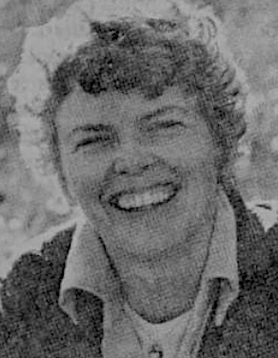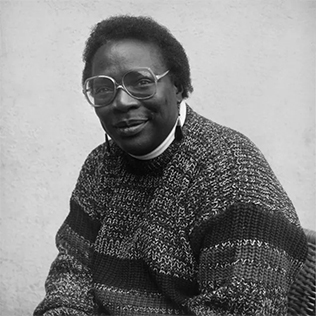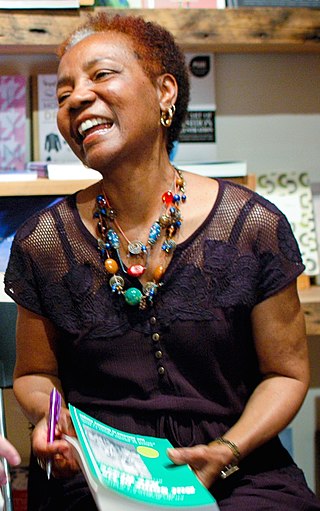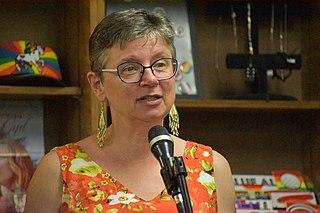Related Research Articles

Adrienne Cecile Rich was an American poet, essayist and feminist. She was called "one of the most widely read and influential poets of the second half of the 20th century", and was credited with bringing "the oppression of women and lesbians to the forefront of poetic discourse". Rich criticized rigid forms of feminist identities, and valorized what she coined the "lesbian continuum", which is a female continuum of solidarity and creativity that impacts and fills women's lives.

Audre Lorde was an American writer, professor, philosopher, intersectional feminist, poet and civil rights activist. She was a self-described "Black, lesbian, feminist, socialist, mother, warrior, poet" who dedicated her life and talents to confronting different forms of injustice, as she believed there could be "no hierarchy of oppressions" among "those who share the goals of liberation and a workable future for our children."

Alicia Suskin Ostriker is an American poet and scholar who writes Jewish feminist poetry. She was called "America's most fiercely honest poet" by Progressive. Additionally, she was one of the first women poets in America to write and publish poems discussing the topic of motherhood. In 2015, she was elected a Chancellor of the Academy of American Poets. In 2018, she was named the New York State Poet Laureate.

Sonia Sanchez is an American poet, writer, and professor. She was a leading figure in the Black Arts Movement and has written over a dozen books of poetry, as well as short stories, critical essays, plays, and children's books. In the 1960s, Sanchez released poems in periodicals targeted towards African-American audiences, and published her debut collection, Homecoming, in 1969. In 1993, she received Pew Fellowship in the Arts, and in 2001 was awarded the Robert Frost Medal for her contributions to the canon of American poetry. She has been influential to other African-American poets, including Krista Franklin. Sanchez is a member of The Wintergreen Women Writers Collective.

Paula Gunn Allen was an American poet, literary critic, activist, professor, and novelist. Of mixed-race European-American, Arab-American, and Native American descent, she identified with her mother's people, the Laguna Pueblo. Gunn Allen wrote numerous essays, stories and poetry with Native American and feminist themes, and two biographies of Native American women. She edited four collections of Native American traditional stories and contemporary writing.
Joan Larkin is an American poet, playwright, and writing teacher. She was active in the small press lesbian feminist publishing explosion of the 1970s, co-founding the independent publishing company Out & Out Books. The science fiction writer Donald Moffitt was her brother.

Minnie Bruce Pratt was an American poet, educator, activist, and essayist. She retired in 2015 from her position as Professor of Writing and Women's Studies at Syracuse University where she was invited to help develop the university's first LGBT studies program.
Elana Dykewomon was an American lesbian activist, author, editor, and teacher. She was a recipient of the Lambda Literary Award for Lesbian Fiction.

Pat Parker was an African American poet and activist. Both her poetry and her activism drew from her experiences as a Black lesbian feminist. Her poetry spoke about her tough childhood growing up in poverty, dealing with sexual assault, and the murder of a sister. At eighteen, Parker was in an abusive relationship and had a miscarriage after being pushed down a flight of stairs. After two divorces, she came out as a lesbian, "embracing her sexuality" and said she was liberated and "knew no limits when it came to expressing the innermost parts of herself".

Terry Wolverton is an American novelist, memoirist, poet, and editor. Her book Insurgent Muse: Life and Art at the Woman's Building, a memoir published in 2002 by City Lights Books, was named one of the "Best Books of 2002" by the Los Angeles Times, and was the winner of the 2003 Publishing Triangle Judy Grahn Award, and a finalist for the Lambda Literary Award. Her novel-in-poems Embers was a finalist for the PEN USA Litfest Poetry Award and the Lambda Literary Award.

Akasha Gloria Hull is an American poet, educator, writer, and critic whose work in African-American literature and as a Black feminist activist has helped shape Women's Studies. As one of the architects of Black Women's Studies, her scholarship and activism has increased the prestige, legitimacy, respect, and popularity of feminism and African-American studies.

Dyke is a slang term, used as a noun meaning lesbian. It originated as a homophobic slur for masculine, butch, or androgynous girls or women. Pejorative use of the word still exists, but the term dyke has been reappropriated by many lesbians to imply assertiveness and toughness.

Martha Shelley is an American activist, writer, and poet best known for her involvement in lesbian feminist activism.
Metaformic Theory states that modern-day material culture is rooted in ancient menstruation rituals, called "metaforms". Metaforms are rituals, rites, myths, ideas, or stories created to contain emerging knowledge relating to menstruation.
Onlywomen Press was a feminist press based in London. It was the only feminist press to be founded by out lesbians, Lilian Mohin, Sheila Shulman, and Deborah Hart. It commenced publishing in 1974 and was one of five notably active feminist publishers in the 1990s.

Lisa L. Moore is a Canadian–American academic and poet. She earned a B.A. in English with honors at Queen's University in 1986, and then completed her doctorate at Cornell University in 1991. Principal themes in Moore’s work include the centrality of love between women to literary genres such as the novel, the landscape arts, and the sonnet; the transatlantic and multi-racial history of feminist art and thinking; and the importance of poetry to second-wave feminist, womanist, and lesbian cultures and politics.
Movement In Black is a collection of poetry by Black lesbian feminist Pat Parker.
Feminist poetry is inspired by, promotes, or elaborates on feminist principles and ideas. It might be written with the conscious aim of expressing feminist principles, although sometimes it is identified as feminist by critics in a later era. Some writers are thought to express feminist ideas even if the writer was not an active member of the political movement during their era. Many feminist movements, however, have embraced poetry as a vehicle for communicating with public audiences through anthologies, poetry collections, and public readings.
Terri Lynn Jewell was an American author, poet and Black lesbian activist. She was the editor of The Black Woman’s Gumbo Ya-Ya, which received the New York City Library Young Persons Reading Award in 1994.
References
- ↑ Grahn, Judy (1984). Another Mother Tongue: Gay Words, Gay Worlds (1990 Expanded ed.). Boston, Massachusetts: Beacon Press. p. 4. ISBN 0-8070-7911-1.
- ↑ Paul Russell (2002). The Gay 100: A Ranking of the Most Influential Gay Men and Lesbians, Past and Present. Kensington Books. pp. 341–343. ISBN 978-0-7582-0100-3 . Retrieved December 29, 2011.
- ↑ Tyrkus, Michael (1997). Gay & Lesbian Biography. St. James Press. pp. 200. ISBN 1-55862-237-3.
- 1 2 Susan Padezanin (2003). "Judy Grahn". Biography. Center for Working Class Studies. Archived from the original on February 12, 2012. Retrieved February 24, 2012.
- ↑ Smith, Martha Nell; Steinberg, Stacy (October 19, 2005) [2002]. "Judy Grahn (b. 1940)". In Summers, Claude J. (ed.). glbtq: An encyclopedia of gay, lesbian, bisexual, transgender, and queer culture . Chicago: glbtq, Inc. Archived from the original on February 13, 2012.
- 1 2 3 4 5 "Judy Grahn in Cyberspace". Biography. Judy Grahn. 2011. Archived from the original on March 7, 2012. Retrieved February 24, 2012.
- 1 2 3 4 5 6 7 8 "Judy Grahn". Poems & Poets. Poetry Foundation. 2011. Archived from the original on February 11, 2012. Retrieved December 29, 2011.
- 1 2 3 Garber, Linda. "Putting the Word Dyke on the Map: Judy Grahn" in Identity Poetics. Columbia University Press, 2001, p. 32.
- 1 2 "Judy Grahn: Blood, Bread, and Roses: How Menstruation Created the World". bailiwick.lib.uiowa.edu. Archived from the original on May 16, 2012. Retrieved May 28, 2012.
- 1 2 3 4 Backus, Margot Gayle. Judy Grahn and the Lesbian Invocational Elegy: Testimonial and Prophetic Responses to Social Death in 'A woman is Talking to Death'. Signs, Vol. 18, No. 4, Theorizing Lesbian Experience (Summer, 1993), p. 816.
- ↑ Tullis, Lynn Bastida. "Materiality, Ideology, and Subjectivity in Judy Grahn's 'The Woman in Three Pieces.' Pacific Coast Philology, Vol. 29, No. 1 (Sep. 1994), p. 70.
- ↑ Grahn, Judy (1984). Another Mother Tongue: Gay Words, Gay Worlds (1990 Expanded ed.). Boston, Massachusetts: Beacon Press. pp. 52–60, 166, 193–201. ISBN 0-8070-7911-1.
- ↑ "Poet, Activist, Scholar". judy grahn official site. 2016. Archived from the original on August 10, 2023. Retrieved August 8, 2023.
From 1981-1986, Judy lived with the Native American critic, novelist, poet, and teacher, Paula Gunn Allen. The two of them held weekly Sunday morning meetings on subjects pertaining to women's spirituality at Mama Bears Coffeehouse and Bookstore at 6536 Telegraph Avenue in north Oakland, just across the Berkeley border, across the street from the White Horse, said to be the oldest gay bar on the West Coast and possibly unique in being a place always friendly to two spirit people of all flavors.
- ↑ "Stonewall Book Awards List | Rainbow Roundtable". www.ala.org. Retrieved October 21, 2024.
- ↑ "The Bill Whitehead Award for Lifetime Achievement". The Publishing Triangle. Retrieved October 19, 2024.
- ↑ "Charlene Spretnak: Forward: Blood, Bread, and Roses: Forward". bailiwick.lib.uiowa.edu. Archived from the original on July 13, 2014. Retrieved May 28, 2012.
- ↑ "Judy Grahn's Published Works • Commonality Institute". Commonality Institute. Archived from the original on January 19, 2019. Retrieved November 30, 2020.